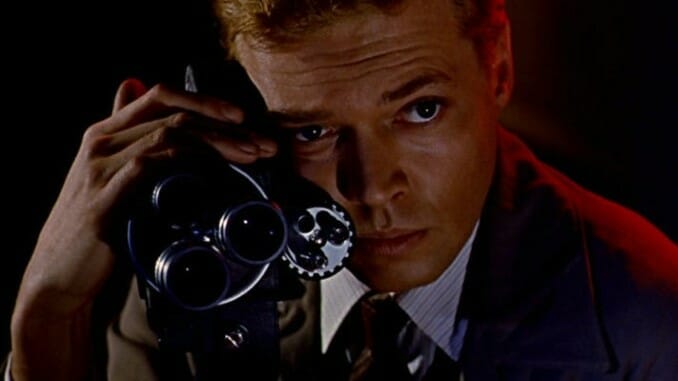ABCs of Horror 2: “P” Is for Peeping Tom (1960)

Paste’s ABCs of Horror 2 is a 26-day project that highlights some of our favorite horror films from each letter of the alphabet. The only criteria: The films chosen can’t have been used in our previous Century of Terror, a 100-day project to choose the best horror film of every year from 1920-2019, nor previous ABCs of Horror entries. With many heavy hitters out of the way, which movies will we choose?
It has often been argued that voyeurism is the nature of cinema itself—the observation of the stories of others from a safe distance, which allows the audience member to indulge in giddy thrills as we look in on something salacious, or shocking, or terrifying. As Roger Ebert once put it, “We sit in the dark, watching other people’s lives. It is the bargain the cinema strikes with us, although most films are too well-behaved to mention it.” The movie that prompted that line was 1960’s Peeping Tom, a richly psychological horror-thriller revered today by classic film devotees, but still sadly overlooked by many rank and file horror geeks. Unlike its most prominent contemporary, Alfred Hitchcock’s Psycho, Peeping Tom never generated fervor at the box office, but its influence has been felt in literally hundreds of psychological thrillers that make up its philosophical progeny. More than 50 years later, it still feels shockingly modern.
In a very central and primal way, Peeping Tom is a film about fear, and the myriad ways that human beings respond to the stress and stimuli of fear. Our lead Mark (Carl Boehm) was molded by abuse structured around intentionally causing and studying fear, the victim of sadistic psychological experimentation throughout his childhood, carried out by his famous scientist father. As with Psycho’s Norman Bates, this serves to make Mark a figure both sympathetic and pitiable, but in comparison the private tortures inflicted on Norman by his mother, Mark arguably has even more reason to carry a grudge against the world. After all, Norman suffered alone, whereas the entire psychological community not only was aware of the experimentation conducted by Mark’s father, but praised him for it, lending the inhumane stamp of bureaucratic approval to the abuse Mark suffered his entire young life. It’s understandable that he too grew up to have an obsession with human fear, which he tragically channels into a series of grisly, experimental killings.
-

-

-

-

-

-

-

-

-

-

-

-

-

-

-

-

-

-

-

-

-

-

-

-

-

-

-

-

-

-

-

-

-

-

-

-

-

-

-

-








































